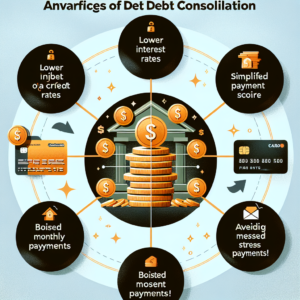
Managing debt is a critical aspect of financial well-being. For many, dealing with overwhelming debt can feel like an uphill battle. Two popular solutions to this problem are debt consolidation and debt settlement, each offering unique approaches to regain control of finances. However, understanding the key differences, benefits, and drawbacks of these methods is essential for making informed decisions. This article dives deep into both strategies, helping you choose the best fit for your financial situation.
What Is Debt Consolidation?
Debt consolidation refers to combining multiple debts into a single loan or payment plan. This strategy aims to simplify debt repayment, potentially lowering the interest rate and making payments more manageable.
How It Works:
Debt consolidation can be achieved through several methods, such as:
- Personal Loans: Borrowing a lump sum to pay off high-interest debts.
- Balance Transfer Credit Cards: Transferring multiple credit card balances to a single card with a lower introductory interest rate.
- Home Equity Loans: Using the equity in your home to secure a loan for debt repayment.
- Credit Counseling Programs: Working with agencies to combine debts into a structured payment plan.
Who Is It For?
Debt consolidation works best for individuals with stable incomes who can afford regular payments but are overwhelmed by managing multiple accounts.
Advantages of Debt Consolidation
-
Simplified Debt Management
Managing a single payment is more convenient than juggling multiple due dates and interest rates. -
Lower Interest Rates
Consolidating high-interest debts (like credit cards) into a lower-interest loan can save money over time. -
Predictable Payments
Fixed monthly payments help with budgeting, providing a clear repayment timeline. -
Potential Credit Score Improvement
By reducing your credit utilization ratio, consolidating debt responsibly can positively impact your credit score.
Drawbacks of Debt Consolidation
-
Requires Good Credit
Access to favorable terms often depends on having a strong credit score. -
Extended Repayment Terms
While monthly payments may decrease, the total repayment period may be longer, leading to higher overall interest. -
Does Not Reduce Debt
Consolidation simplifies payments but does not lower the principal owed. -
Risk of New Debt Accumulation
Without addressing the root cause of financial habits, individuals may incur new debt, worsening their situation.
What Is Debt Settlement?
Debt settlement is a more aggressive approach, where individuals or debt settlement companies negotiate with creditors to reduce the total amount owed. This strategy is often a last resort for those in severe financial distress.
How It Works:
Debt settlement involves:
- Stopping payments on existing debts, which may lead to penalties or lawsuits.
- Saving funds to make a lump-sum payment offer to creditors.
- Negotiating with creditors to accept less than the full amount owed.
Who Is It For?
Debt settlement is suited for individuals who cannot afford their current debt payments and are facing potential bankruptcy.
Advantages of Debt Settlement
-
Reduced Total Debt
Creditors may agree to settle for a fraction of the original amount, offering significant savings. -
Faster Resolution
Compared to long-term repayment plans, settlements can resolve debts in a shorter timeframe. -
Avoids Bankruptcy
For individuals on the brink of bankruptcy, settlement provides an alternative path to debt resolution.
Drawbacks of Debt Settlement
-
Negative Impact on Credit Score
Accounts marked as “settled for less” remain on credit reports for up to seven years, significantly lowering credit scores. -
Creditor Resistance
Creditors are not obligated to settle, and some may opt to pursue legal action. -
High Fees and Taxes
Settlement companies charge substantial fees, and forgiven debt may be considered taxable income. -
Emotional Stress
The process often involves months of non-payment, aggressive collection attempts, and financial uncertainty.
Debt Consolidation vs. Debt Settlement: Key Differences
| Feature | Debt Consolidation | Debt Settlement |
|---|---|---|
| Objective | Simplify and manage debt | Reduce the total amount owed |
| Impact on Credit | Positive if managed well | Negative due to missed payments |
| Cost | Loan interest rates and possible fees | Settlement fees and potential tax liabilities |
| Timeline | Long-term repayment | Shorter, depending on negotiations |
| Eligibility | Requires stable income and good credit | No credit score requirement, but severe hardship is needed |
Choosing the Right Option
The choice between debt consolidation and settlement depends on individual circumstances:
1. Assess Your Financial Situation
- Income Stability: If you have a steady income, consolidation might be more feasible.
- Debt Severity: For unmanageable debt, settlement may be necessary.
2. Consider Your Goals
- Long-Term Financial Health: Consolidation offers predictability and stability.
- Immediate Relief: Settlement provides quicker resolution but comes with risks.
3. Evaluate Risk Tolerance
- Credit Impact: If maintaining a good credit score is essential, consolidation is preferable.
- Emotional Resilience: Settlement requires enduring collection calls and potential lawsuits.
Getting Started
For Debt Consolidation
- Check Your Credit Score: Higher scores unlock better terms.
- Compare Loan Options: Research lenders and terms for the best fit.
- Commit to a Budget: Ensure affordability and prevent new debt accumulation.
For Debt Settlement
- Research Settlement Companies: Avoid scams by selecting reputable firms.
- Save Funds: Prepare for lump-sum negotiations.
- Be Prepared for Risks: Understand the potential credit and legal implications.
Alternatives to Consider
For those uncertain about consolidation or settlement, other options include:
-
Credit Counseling Agencies
Professionals can assist with budgeting and negotiating better payment terms. -
Debt Management Plans (DMPs)
Structured programs consolidate payments without taking new loans. -
Bankruptcy
A legal process for debt elimination, but with long-term credit consequences.
Debt consolidation and settlement serve distinct purposes, catering to different financial needs. While consolidation simplifies debt management for those with stable finances, settlement offers relief for severe hardship at a cost to credit health. The best option depends on individual goals, risks, and circumstances.
Seeking advice from financial professionals can provide additional clarity, ensuring a well-informed path to financial freedom.
FAQs
1. Does debt consolidation hurt my credit?
If managed responsibly, debt consolidation can improve your credit score by lowering your credit utilization ratio and ensuring consistent payments.
2. Can I negotiate debt settlement myself?
Yes, individuals can negotiate directly with creditors, but hiring a professional may yield better results, albeit with additional fees.
3. Is forgiven debt taxable?
Yes, forgiven debt is often considered taxable income. Check with a tax advisor to understand the implications.
4. Which is better for severe financial hardship?
Debt settlement is better for severe hardship as it reduces the total amount owed, but it carries risks like credit damage and legal action.
5. How do I avoid accumulating new debt after consolidation?
Adopting disciplined financial habits, such as budgeting and limiting credit card use, is essential to prevent new debt.
Visit our other website: https://synergypublish.com


